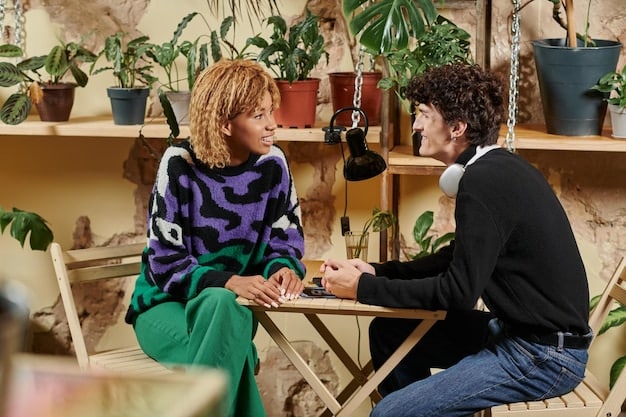Navigate Relationship Stress: Effective Communication for Mind Health

Navigating relationship stress effectively hinges on mastering key communication techniques that foster healthier connections and promote individual mental wellness, ensuring both partners feel heard, understood, and valued.
Relationship stress is an inevitable part of life, but how we navigate it can significantly impact our mental wellness. Mastering effective communication techniques can transform stressful interactions into opportunities for growth and deeper connection. Let’s explore how to build a healthier mind by improving communication in your relationships.
Understanding the Roots of Relationship Stress
Relationship stress often stems from unmet needs, differing expectations, or unresolved conflicts. Recognizing these underlying causes is the first step towards managing stress and improving communication.
Understanding where the stress originates enables couples to tackle the issues more efficiently, leading to stronger and more resilient relationships. Pinpointing the root causes is crucial in developing long-term solutions.
Common Stress Triggers
Several common triggers can contribute to relationship stress. Being aware of these can help couples identify and address them proactively.
- Financial Issues: Money is frequently a source of tension, especially when couples have different spending habits or financial goals.
- Communication Breakdown: Misunderstandings and poor communication can lead to conflicts and feelings of isolation.
- Lack of Intimacy: Emotional or physical distance can create feelings of disconnection and resentment.
- Differing Expectations: Conflicting visions for the future or daily life can cause friction.
By identifying these triggers, couples can begin to address the core issues and work towards solutions that benefit both partners.
The Foundation of Healthy Communication
Healthy communication is the bedrock of any successful relationship. It involves creating a safe space where both partners feel comfortable expressing their thoughts and feelings without fear of judgment.
When communication is open, honest, and respectful, couples can navigate challenges more effectively and strengthen their bond. Building this foundation requires conscious effort and practice.

Active Listening Skills
Active listening involves fully concentrating, understanding, responding, and remembering what is being said. It’s a crucial skill for effective communication.
Practicing active listening strengthens empathy and helps partners feel truly heard and valued. Key components include maintaining eye contact, nodding, and summarizing what you’ve heard to ensure understanding.
Active listening goes beyond just hearing words; it involves understanding the emotional content and context of the message. This deeper level of understanding fosters stronger emotional connections.
Techniques for Effective Communication
Effective communication techniques can help couples express their needs and resolve conflicts constructively. These techniques aim to minimize misunderstandings and promote mutual respect.
Adopting these techniques requires practice and patience, but the rewards are well worth the effort. When both partners commit to improving their communication, the relationship can become stronger and more fulfilling.
Using “I” Statements
“I” statements allow you to express your feelings and needs without blaming your partner. This approach reduces defensiveness and encourages open dialogue.
For example, instead of saying “You never listen to me,” try saying “I feel unheard when I’m not given a chance to finish speaking.” This phrasing is less accusatory and more focused on your own experience.
- Focus on Your Feelings: Express how you feel without placing blame.
- State Your Needs: Clearly articulate what you need from your partner.
- Avoid Accusations: Frame your statements in a way that avoids blaming or criticizing.
Using “I” statements can transform conflict into a constructive conversation where both partners feel understood and respected.
Managing Conflict Constructively
Conflict is a natural part of any relationship, but how it’s managed can either strengthen or weaken the bond. Constructive conflict resolution focuses on finding solutions rather than assigning blame.
Developing strategies for managing conflict can help couples navigate disagreements more effectively and maintain a healthy relationship dynamic. This involves learning to compromise and find common ground.

Taking a Time-Out
When emotions run high, taking a time-out can prevent escalation. Agree to step away from the conversation and return when everyone is calmer.
During the time-out, engage in activities that help you relax and regain perspective. This could include deep breathing exercises, meditation, or simply taking a walk.
- Recognize Escalation: Identify the signs that a conflict is becoming unproductive.
- Agree on a Signal: Establish a signal that indicates when a time-out is needed.
- Return Calmly: After the time-out, approach the conversation with a calmer and more rational mindset.
Using time-outs effectively can de-escalate conflicts and allow for more rational and productive discussions.
Building Empathy and Understanding
Empathy involves understanding and sharing the feelings of another person. Cultivating empathy in a relationship can deepen connection and improve communication.
When partners are able to understand each other’s perspectives, they are better equipped to resolve conflicts and support each other through challenges. Building empathy requires active effort and a willingness to see things from your partner’s point of view.
Practicing Perspective-Taking
Perspective-taking involves trying to understand a situation from your partner’s point of view. This can help you see beyond your own feelings and recognize their experiences.
Ask yourself how your partner might be feeling and why they might be reacting in a certain way. Consider their past experiences and personal values, which may influence their perspective.
By consciously trying to understand your partner’s perspective, you can bridge gaps and foster greater empathy and understanding in the relationship.
Seeking Professional Help
Sometimes, relationship stress is too overwhelming to manage alone. Seeking professional help from a therapist or counselor can provide valuable tools and strategies for improving communication and resolving conflicts.
Therapy offers a safe and supportive environment where couples can explore their issues and learn how to communicate more effectively. It’s a sign of strength, not weakness, to seek help when needed.
Benefits of Therapy
Therapy can provide numerous benefits, including improved communication, conflict-resolution skills, and a deeper understanding of each other.
A therapist can offer objective insights and guidance, helping couples identify and address the root causes of their stress. They can also teach practical techniques for managing conflicts and strengthening the relationship.
- Improved Communication: Learn effective ways to express your needs and listen to your partner.
- Conflict Resolution: Develop strategies for managing disagreements constructively.
- Deeper Understanding: Gain insights into each other’s perspectives and emotional needs.
Seeking professional help can transform a struggling relationship into a thriving partnership.
| Key Point | Brief Description |
|---|---|
| 🗣️ Active Listening | Focus on fully understanding your partner’s perspective. |
| 🤝 “I” Statements | Express feelings without blaming; focus on your experience. |
| ⏰ Time-Outs | Take breaks during conflicts to cool down and regain perspective. |
| 🫂 Empathy | Understand and share your partner’s feelings to deepen connection. |
Frequently Asked Questions
▼
Common causes include financial issues, communication breakdowns, lack of intimacy, and differing expectations. Addressing these underlying factors is crucial for resolving stress.
▼
Active listening strengthens empathy and ensures both partners feel heard and valued. It involves fully concentrating, understanding, responding, and remembering what is said.
▼
“I” statements allow you to express your needs and feelings without blaming your partner. This approach reduces defensiveness and encourages open dialogue.
▼
Consider seeking help when relationship stress is overwhelming or when communication problems persist despite efforts to improve. Therapy can provide valuable tools and strategies.
▼
Empathy can be cultivated by practicing perspective-taking, actively listening to your partner, and trying to understand their feelings and experiences without judgment.
Conclusion
Navigating relationship stress: communication techniques for a healthier mind requires dedication and conscious effort to implement effective strategies. By addressing the root causes of stress, practicing active listening, using “I” statements, managing conflict constructively, building empathy, and seeking professional help when needed, couples can strengthen their bonds, improve their mental wellness, and cultivate more fulfilling relationships.





